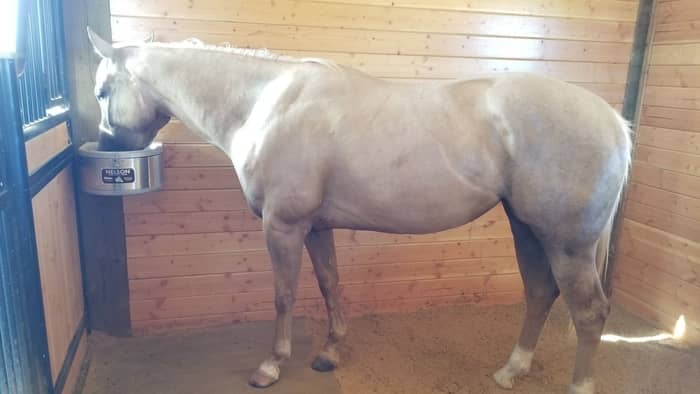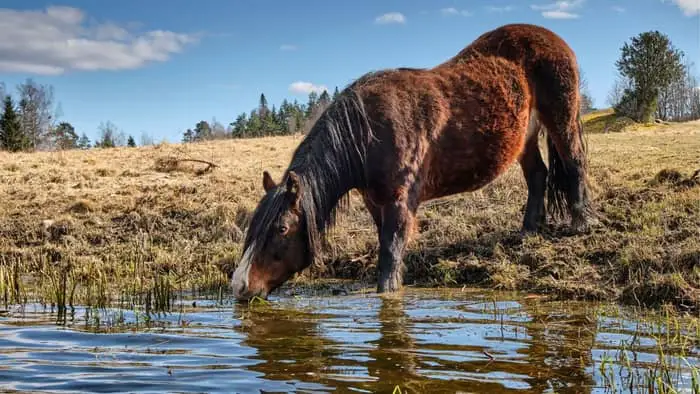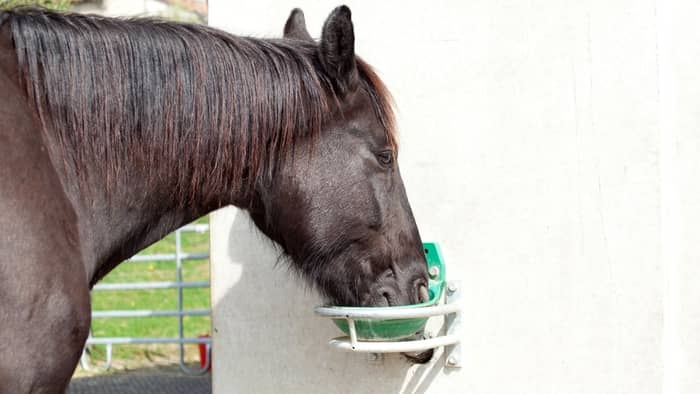Last Updated on June 19, 2022 by Guillermina
If you have a large farm or herd, investing in an automatic water feeder for your horses will save you lots of time and energy!
These automatic systems help you provide your horses with fresh, clean water even when you forget or don’t have the time to fill up their cribs.
In this article, I share why an automatic water feeder is a good investment, what to consider when buying one, and how much water your horse will need each day.
Automatic Water Feeder For Horses: Is It A Good Investment?
One of the most common causes of any livestock ailments is dehydration. An automatic waterer will make giving your animals water an easier task.
Having an automatic water feeder for your horses has many benefits. Here are some:
Clean and Safe Water
A water feeder for horses is fit below ground level. The water surfaces when the water feeder is in use.
No bugs or debris can get into this enclosed water source. Algae and mold growth is also prevented because the water moves around once your horse uses their feeder.

Temperature Control
An automatic water feeder helps to maintain a comfortable water temperature. In the summer, it keeps water cool, and in the winter, it helps keep it warm.
Your horses will drink more water when its temperature is adjusted to the season you’re in. Some water feeders can even keep the water from freezing during the winter.
Time-Saving
Having an automatic water feeder will save you time. You’ll spend less time filling up water cribs and have more time to do other tasks.
Installing an automatic water feeder for your horses will help you give them a steady supply of fresh, temperature-controlled water whenever they need it.
You should still, however, check your horses’ water daily.
What To Look For In An Automatic Water Feeder
There are many different automatic water feeders available, and you’ll have to decide which will work best for you. Here are some things to keep in mind when you start shopping for one!
The Edges: Many older water feeders have sharp metal edges that could injure your horse. Check the edges and ensure that they’re made from a soft material that’s safe for contact.
Material: Ensure that the water feeder you choose is made from a solid material that won’t rust, dent, or break easily.
Insulation: Your water feeder should be well-insulated to prevent freezing during the winter and keep water cool during the summer. This will also reduce water evaporation.
Refill Time: Choose a water filter that refills quickly. If you have more than one horse drinking from it, a slow refilling water feeder won’t work.
Size: Choosing the right size water feeder will ensure your horse has enough clean water whenever they need it.
Ease: Consider how easy it will be to clean and maintain the feeder, keeping in mind that stainless or galvanized steel will not absorb odors.
How Much Water Do Horses Need Per Day

The exact amount is dependent on the horse, but typically they need about 5 to 10 gallons of fresh water every day!
A horse can only survive without water for 3 to 6 days. After two days with no water, a horse might refuse to eat or show signs of colic and other life-threatening diseases.
Your horse’s water requirements will fluctuate as their workload increases or decreases. A horse you frequently and energetically ride for pleasure will require more water than one that’s ridden occasionally.
Due to losses in sweat, respiration, higher feed intake, and increased urination, performance and workhorses will require one and a half to two times more water.
Reasons Why Horses Need Water
Horses need water for several reasons, but here are the most obvious:
Digestion: A horse’s digestive tract requires plenty of clean, fresh water to function correctly. Their high-fiber diet (grass, hay, etc.) necessitates a lot of water to keep the fiber moving through the digestive system.
Circulatory System: Horses who refuse to drink water are prone to poor performance, organ failure, and colic. Water is also essential for a horse’s circulatory system. It cannot function without it.
Tears and Mucus: A horse’s eyes and nostrils require water for tears and mucus production.
Thermoregulation: Horses require water to regulate their body temperature.
Physiological Processes: Water is essential for critical physiological processes like nutrient absorption and digestion, muscular contraction strength, joint lubrication, and waste removal.
Final Words
Giving your horses enough clean water each day can be a tedious task, and if you have lots of farm work waiting, you might want to speed this process up.
With an automatic water feeder, you won’t have to spend as much time supplying your horses with fresh water, and the chance of them dehydrating during the day is decreased.
I hope this article was helpful. If you have any more questions about automatic water feeders for horses, pop them in the comments, and I’ll get back to you!
FAQs
Are automatic waterers good for horses?
Yes.
Automatic water feeders help provide horses with a steady supply of fresh, clean water whenever they need it. These feeders decrease the chance of dehydration in horses.
How do auto waterers work?
There are many different automatic water feeders, each working uniquely. The most common water feeders feed a crib with water whenever a horse starts drinking.
Other constantly moves the water around, similar to a fountain, to keep mold and algae growth at bay. Your horse is then free to take a sip whenever they need to.
What is the main disadvantage of using an automated watering system for horses?
If you use an automatic water system for your horses, you might get lazy and neglect to check their water every day. Even if you have an automated system, you still need to ensure that they have a daily water supply and regularly maintain the water feeder.
How much water per day should you give your horse?
Horses need about 5 to 10 gallons of water each day, so you'll need to buy an automatic water feeder with this capacity.

